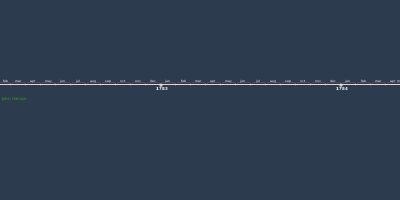1 sept 1842 año - Tariff of 1842
Descripción:
AKA: Black TariffA protectionist tariff schedule adopted in the United States. It reversed the effects of the Compromise Tariff of 1833, which contained a provision that successively lowered the tariff rates from their level under the Tariff of 1832 over a period of ten years until the majority of dutiable goods were to be taxed at 20%.
As the 20% level approached in 1842, industrial interests and members of the Whig Party began clamoring for protection by claiming that the reductions left them vulnerable to European competition.
The defiant Whig Congress would not raise tariffs in a way that would affect the distribution of funds to states. In June 1842 they passed two bills that would raise tariffs and unconditionally extend the distribution program. Believing it improper to continue distribution at a time when federal revenue shortage necessitated increasing the tariff, Tyler vetoed both bills, burning any remaining bridges between himself and the Whigs. Congress tried again, combining the two into one bill; Tyler vetoed it again, to the dismay of many in Congress, who nevertheless failed to override the veto. As some action was necessary, Whigs in Congress, led by the House Ways and Means chairman Millard Fillmore, passed in each house (by one vote) a bill restoring tariffs to 1832 levels and ending the distribution program. Tyler signed the Tariff of 1842 on August 30, pocket vetoing a separate bill to restore distribution.
The bill restored protection and raised average tariff rates to almost 40% and stipulated sweeping changes to the tariff schedule and collection system, most of which were designed to augment its protective character. It also replaced most ad valorem rates with specific duties, assessed on a good-by-good basis, and replaced the credit system of tariff finance with a cash payment system, collected at portside customs houses.
The impact of the 1842 tariff was felt almost immediately, with sharp decline in international trade in 1843. Imports into the United States nearly halved from their 1842 levels and exports, affected by overall trade patterns, dropped by approximately 20%.
The Tariff of 1842 was repealed in 1846, when it was replaced by the Walker Tariff. The Whigs' loss of Congress and the presidency in 1844 facilitated a Democratic-led effort to reduce the rates again. Concerns that the Black Tariff's high rates would suppress future trade and, with it, customs revenue fueled the movement to repeal the act.
Añadido al timeline:
fecha:
1 sept 1842 año
Ahora mismo
~ 183 years ago
